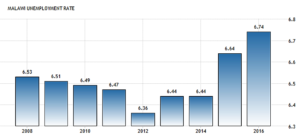How blackouts put an increasing pressure on Malawi's manufacturing sector

Although households are the single biggest consumer of energy, the manufacturing sector, local industry and agriculture sector are experiencing an increase in national energy demand. Tea and tobacco factories need power to dry and roll the leaves, hardware manufacturers need electric heat to form their materials, dairy farmers have to refrigerate their products to prevent them from going bad. It is obvious that there is a strong dependency on constant and reliable power input.
When a blackout hits these industries, they will have to switch to an alternative power source, in many cases the only option is to use diesel generators to produce the needed electricity. These alternatives, however, are more expensive than the normal grid electricity and many manufacturers cannot afford the costs on an ongoing basis. Additionally these diesel powered generators add to the already heavy burden of importing diesel to meet the increased demand and in turn increasing demand for foreign currency that usually results in a higher rate of inflation that only hurts the poor.

In other cases, different measures are being taken. Some companies scale down their production in order to decrease their demand for energy. This, however, causes shortages on the market resulting in rising prices (a good example are the rising prices of cement during seasons with increased load-shedding). Other companies deal with the issue by downsizing their labour force. As a consequence, workers lose their jobs contributing to the already high levels of unemployment in Malawi.
All these factors put more and more pressure on the economy and leave a poor image of the country’s economic situation. Investors see no real value in investing their money into Malawian companies as their productivity is threatened by the unstable energy situation. Whilst Foreign investors with investments already in the country cannot see any meaningful returns on their investments prompting them to decide to move their investments to neighbouring countries that have a more stable and reliable energy supply.
Read more about Energy Poverty and Health